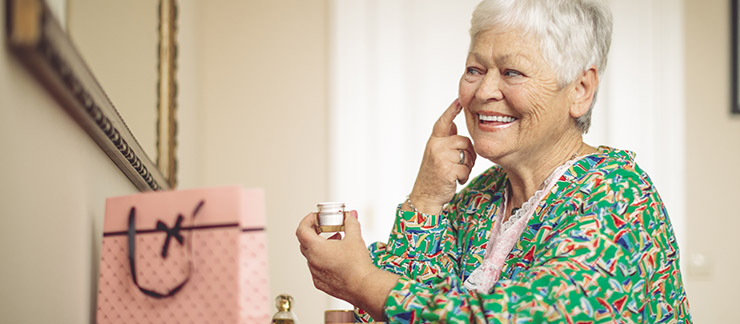
Skin Protection for Seniors: What You Need to Know
Our skin changes dramatically as we age, and many of these changes are unwanted. Older adults, especially, need to take care of their skin because they are more susceptible to conditions such as age spots, dryness, wrinkles, and even cancer, which arise during the aging process.
But, there are things seniors can do to protect and revitalize their skin. Proper skincare can keep older adults' skin healthy, robust, and youthful, while helping to prevent and reverse skin damage caused by sunlight, exposure to the elements, and the aging process.
It’s never too late to start an effective skincare routine for healthier skin.
How Does Aging Affect the Skin?
Many skin conditions can develop as you age, including:
- Fine lines and wrinkles
The face and neck receive a lot of sun exposure and can lead to fine lines and wrinkles. Sun exposure breaks down the connective tissue in your skin over time and, when combined with the loss of skin elasticity that accompanies age, speeds up sagging and wrinkles. Smoking also contributes to the development of wrinkled skin.
- Age spots and skin tags
Both age spots – sometimes called liver spots – and skin tags are generally harmless, though they can become irritated, and many seniors dislike their appearance. Age spots are brought on by sun exposure and skin tags are a normal part of aging.
- Dry and itchy skin
Patches of dry and itchy skin are common among seniors and frequently develop on the elbows, lower legs, and lower arms. Dry and itchy skin can be caused by stress, smoking, dehydration, exposure to dry air, too much time in the sun, or even the loss of sweat and oil glands.
- Slower healing
For most children, scrapes, cuts, bruises, and other minor injuries to the skin heal very quickly and with little care. But as you age, your skin loses the ability to repair itself because your healing mechanisms slow down. Chronic conditions and malnutrition can further slow healing. Additionally, thinner and drier skin means many injuries and wounds become wider or deeper than they otherwise would be, so they take even more time to heal.
- Increased risk of skin cancer
Just as the risk of heart disease increases with age, the risk of developing skin cancer also increases. Skin cancer risk is linked to ultraviolet light exposure from sunlight or tanning booths and a family history of skin cancer.
- Neurological conditions and compulsive skin picking
Alzheimer’s disease, dementia, and other neurological conditions are more common with age and are linked to an increased risk of compulsive skin picking disorder. Compulsive skin picking disorder is characterized by repetitive urges to scratch at, pull, or pick at areas of the skin. Many people, especially elderly people, with compulsive skin picking disorder can unintentionally injure themselves or increase their risk of developing a skin infection.
Skincare Tips for Seniors
Proper skin care for seniors is essential, and qualified home care workers from Visiting Angels can assist in all aspects of senior skincare. Proper skincare for seniors includes:
- A daily routine
Applying moisturizing creams and exfoliating skin every day will help keep it robust and hydrated. Additionally, bathing or showering in warm, but not hot, water will prevent skin from drying out. Using an at-home humidifier will also help to limit exposure to dry air and prevent dry skin.
- Using sunscreen and avoiding excess UV light exposure
Avoid spending time in the sunlight between 10 am and 4 pm, even on cloudy days, when the sun’s rays are strongest. Use sunscreen with a strength of at least 15 SPF and reapply every two hours – sooner if swimming, sweating, or drying off with a towel. Do not use sunlamps or tanning beds and wear protective clothing to further limit your exposure to ultraviolet light.
- Diet and hydration
Staying hydrated and eating a healthy diet are vital for healthy skin. Getting the right amount of nutrients and water will make sure the skin can heal well and more rapidly.
- Regular skin inspections
Caregivers should keep an eye out for skin changes, look for the ABCDEs of skin cancer, and be aware of any areas of skin that are irritated or not healing. Speak to your loved one’s doctor if you notice any growths or wounds that change over time or do not heal.
- Managing compulsive skin picking disorder
For seniors with neurological conditions such as dementia, qualified home care workers can assist in managing a compulsive skin picking disorder. Working on simple puzzles, folding paper, and sorting buttons are all activities that can be used to control skin picking.
A qualified home care provider such as Visiting Angels can help seniors improve the health of their skin by looking for early signs of cancer, following a healthy diet, providing bathing assistance, and providing other skincare best practices.
